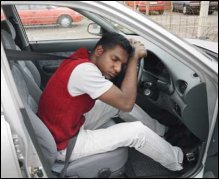Sleeping and Driving Don't MixA MIND calling out for sleep and driving don’t mix – in fact, it can be a lethal cocktail. Sleepiness slows reaction time, decreases awareness, and impairs judgment – just like drugs or alcohol. And just like drugs and alcohol, sleepiness can contribute to a collision. We often hear people talking about the dangers of drinking and driving and rarely about how driving in a drowsy state can be just as dangerous as driving drunk. And recent studies have shown that lunchtime drinks and lack of sleep can contribute to impaired judgement. But worse still, a lack of sleep combined with drinking, significantly increases lane drifting – a common occurrence when one finds sleep beckoning as one drives. Shifting from one lane to another without giving other motorists a clear indication first of your intention can only be a recipe for a collision. The need for education in this area of road safety becomes evident when one realizes that drivers rarely consider a poor night’s rest or drinking as probable causes of the strong urge to sleep while at the wheel. A study has revealed that while participants’ driving capability was impaired, the amount of alcohol in the beverages provided to the men was not enough to cause them to fail a standard breathalyzer test. It must be remembered that it is extremely difficult to control your own sleep. If you're tired you can fall asleep at any time. If you're about to fall asleep, you will experience some or all of the following: The danger signals:
If you have even one of these symptoms, you could be sleepier than you think. Pull off the road and get some sleep. You cannot drive with your eyes closed. Studies have shown the following risk factors implicated in drowsy driving crashes:
If your answer is a "yes" to any one of the above, you are at a higher risk of having a drowsy-driving crash, even if you don't feel sleepy. Many drivers who had drowsy-driving crashes say they felt "only slightly sleepy" or "not at all sleepy" right before the crash.
Related TopicsManagement of fatigue in road transport Exercises you can do to beat road fatigue Beware the highway hypnosis that plagues drivers
|
